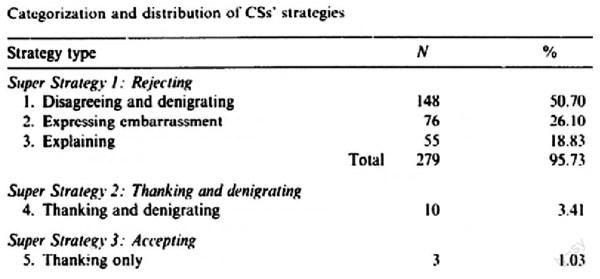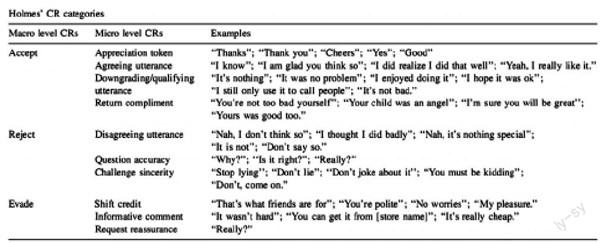Investigation of Chinese Compliment Response Strategies
2015-05-30陈丽敏


【Abstract】Chinese compliment response strategies are different from westerns.According to the investigation of Chinese politeness,the compliment strategies,and the analysis of the examples,writer summarizes Chinese strategies of Compliment response.The results could be benefit for the cross-cultural communication.
【Key Words】 compliment response;strategies;politeness;culture
作者:廣西机电工程学校 广西南宁 530001
Introduction
“Your dress is beautiful”,“You look good today”,these phatic expressions appear frequently in peoples daily conversation.These words are called compliments.However,a compliment has to be presented with the response of it.“The speech acts of compliment and compliment response are conversational devices of interpersonal relationships in daily life” (Tang & Zhang,2009).To be polite,people would response to the compliment.To an English speaker,the polite way of response to it would be “Thank you” in order to show the agreement to the speaker.In contrast,Chinese speaker probably would response “No,just so so” or “No,you look better”.
Though all the people in different social communities would use compliments in their daily communication,the responses to compliments would be different in different cultural background.People from different cultural backgrounds would have different compliment response strategies.In cross-cultural communication,some inappropriate responses would lead to misunderstanding between speakers and responders who are from different cultural backgrounds.It often happens between Chinese and English speakers.Therefore,knowing about the differences of compliment response strategies would be helpful for mutual communication.
This research paper aims to determine Chinese compliment response strategies and the factor that influence adapting those strategies.In terms of the investigation,it would be benefit for improving cross-cultural communication.
Background of Politeness
Compliments take a crucial part in peoples social contacts.Tang and Zhang (2009) believe that compliments are an important speech act in a socio-cultural context.People are happy to hear compliments and they would be helpful for establishing or maintaining the relationships between people.Holmes (1988) suggests that the most obvious function that compliments serve “is to oil the social wheels,paying attention to positive face wants and thus increasing or consolidating solidarity between people” (Holmes,1988).
According to Tang and Zhang (2009),the use of compliment response as a phatic expression is considered as “a particular role in maintaining the solidarity of interpersonal relationships and the harmony of social interaction” (Tang & Zhang,2009).
However,the responses to compliments vary in different cultural communities.Then,what causes these differences? The answer could be the concepts of politeness.Huang (2008) points out that “different culture causes different views of values,which affects the criteria of politeness and leads to differences in various aspects” (Huang,2008).
Holmes (1988) suggests that “a compliment is a speech act which explicitly or implicitly attributes credit to someone other than the speaker,usually the person addressed,for some ‘good (possession,characteristic,skill etc.) which is positively valued by the speaker and the hearer” (Holmes,1988).
In western peoples point of views,it is normal and polite to accept the compliments.However,Chinese would not accept them directly because of the influence of the notions of politeness.Huang (2008) concludes that politeness could be considered as a social phenomenon,an approach to establish interpersonal relationships,and a criterion of social traditions Therefore,Chinese have to response to the compliments in terms of their value.
In modern Chinese words,the English word ‘politeness could be approximately equal to ‘li mao which is “derived from the old Chinese word ‘li” (Gu,1990).According to Gu (1990),‘li was initially formulated by ancient Chinese philosopher Confucius (B.C.551—479) whose notions have crucial impact on Chinese.And two or three hundred years later,the usage of ‘li was well established in the book Li Ji.At the beginning of the book,it says “Deference cannot be shown”,“Speaking of li [i.e.politeness],humble yourself but show respect to other” (Li Ji,cited in Gu,1990).This notion has become the prominent feature of Chinese politeness.Davidson,Scherer and Goldsmith also believe that “in light of the Confucian ideal that individuals are not viewed as isolated from their social relations,an individuals worthy accomplishments are not attributed exclusively to the self” (Mascolo,Fischer,& Li,2003).In a word,people have to be conventional; everybody can not show their personalities; people should be modest and belittle themselves but respect and upgrade others.“Thus,when a person performs a worthy action,the appropriate response is not self-celebration but instead modesty,self-effacement,and praise for the other (Li,cited in Mascolo,Fischer,& Li,2003,p 387).
Gu (1990) concludes the essential factors of Chinese conception of ‘limao as four notions: “respectfulness”,“modesty”,“attitudinal warmth”,“refinement”.
In addition,Gu (1990) refers to another notion that is prevalent in Chinese polite culture called ‘huan li which means returning politeness in English.It means that when people receive genuine polite behaviour,they have to the similar behaviour in return.And the purpose of the return politeness is to keep the conversation balance.In Chinese community,face is another element to concern.In Confucianism,face is regarded as particularly important Therefore,“The balance of face plays a crucial role in Chinese discourse,because giving face to others at the same time helps one earn the recognition of the group,thereby not only protecting but also enhancing ones own face” (Yu,2003).
In accordance with these principles,Chinese would not directly accept other peoples compliments.If people accept the compliments,they would be regarded as not modest and offended.Chinese culture has the feature of collectivity-orientation,so Chinese value collective harmony,interdependence,and not to highlight individuals.
Compliment Response strategies
In terms of presenting the evidence that influence the language use,the compliment response strategies that Chinese prefer to adapt will be investigated.
Many researchers (Pomerantz,Herbert,Holmes,Chen) have done the study on the response to compliments under different cultural backgrounds.Pomerantz (1987) points out that the responders should follow two maxims when they respond to the compliments: Agreement Maxim and Modesty maxim.He also concludes five response strategies: Upgrade,Scale-down agreement,Down-grades,Reassignment of praise and Return.However,Herbert (1990) believes that it is difficult to follow these two principles at the same time,because once you accept the compliments you to some extend are up-praising yourself.In fact,his opinion is accordance with Chinese polite principles.Chinese value modesty,so they normally are not willing to accept peoples compliments directly to show their modesty.The compliment response strategies are broadly categorized into three actions by Holmes (1988): Accept,Reject and Deflect or Evade.Herbert (1990) also divides the strategies into three categories: Agreement,Non-Agreement,and Other Interpretation,which are similar to Chens (1993) categories of compliment response strategies.Chen (1993) categorizes the strategies into three types which are almost the same as Holmess categories: Rejecting,Thanking and Denigrating,and Accepting.It seems that the researchers have similar comments on the categorization of Compliment Response strategies.Chen (1993) focuses the research on Chinese University students.The results are presented as the following table:
(Chen,1993,Journal of Pragmatics 20 p56)
From this data shown above,most of the participants (95.73%) obviously would like to use Rejecting strategy to respond to others compliments.3.41 of them would say “thank you” but denigrating themselves later on.Only approximately 1% of the participants would only express thanking to the complimenters.
However,these researches were done many years ago,so the data could just reflect the situation of that time.Though traditional culture has significant influence on peoples usage of strategies,it is inevitable that culture has been changing gradually.Therefore,peoples attitudes toward responding to compliments would be changed in these years.In that case,the data of Chens study could be a reference resource.What is more,all the Chinese participants of Chens research are university students.The data from a certain group of people could not represent the whole social communitys,because these students share the similar educational background,age,vocation.The people who have different background perhaps would have different attitudes on the issue.
Method and theory
The findings of the research would be assembled by writers observations on peoples daily life and own experiences.Furthermore,the examples would be collected in terms of Holmess macro strategies (Accept,Reject and Evade) and her micro-strategies which would be shown as the following table:
There will be no certain groups of participants who involve in the research.Writer believes that questionnaire and interview to some extend could not reflect the real data.The data collected from real life,movie or TV drama would be more authentic.Besides,certain group of participants could not cover the responses from all the people from different backgrounds including education,age,vacation,status and so on.
The data will be compared with Chens (1993) study of compliment response type.And the examples will be shown in Chinese Characters,Chinese Pinyin as well as English version.They will be presented in terms of different topics of compliments including “appearance,ability or performance,possessions,and some aspect of personality or friendliness” (Holmes,1998).
Results
In this part,the examples of the response to compliments strategies are presented in three sections: (1) Rejecting; (2) Evade; (3) Accepting.Besides,the compliment topics involve appearance,ability,possessions,personality or others.
Rejecting examples
1.A: 你今天看起来气色不错啊。
You look good today.
B : 哪里!比起你差远了。
No,you look much better.
In this conversation,responder B rejects the compliment and returns the compliment to A.It shows a very traditional Chinese ‘li mao: return the similar behaviour (还礼,huanli).It implies the principles of ‘li mao: sincerity and balance (Gu,1990).In order to meet the balance of the relationship between speakers,huanli seems important.
2.A: 你家房子好大啊。
Your house is really large.
B: 哪里。还好啦。
No,its just so so.
These examples frequently appear in Chinese daily life.The following conversation is usually shown in Chinese movies especially the movies about Chinese ancient times.People at that time not only reject others compliments but also self-efface.
3.A: 令公子真是才貌双全啊。
Your son is endowed with both beauty and talent.
B: 您过奖了,小儿不才,什么都不懂。
You overpraised him.He isnt.He knows nothing.
When the guest praise the host or hostesss cooking,they would always degrade them even it is really a sumptuous cuisine.On the one hand,they have to cook nice food for the guest to show their respect; on the other hand,they have to be modest and degrade their food also in order to show respect to the guest.This context just meets the essential factors of Chinese ‘li mao which is suggested by Gu (1990).
4.A: 今天你做的菜真好吃啊!
You cook really good food today.
B: 哪里。只是粗茶淡饭。不足挂齿。
Not really.Just a simple meal.It doesnt worth mentioning.
Evading examples
5.A: 恭喜你,这是很好的报告。
Congratulations.It was a good presentation.
B: 谢谢,这是我第一次做报告,我很紧张。
Thank you.This is my first time to do presentation,so Im really nervous.
Speaker B seems not spontaneous to accept the compliment,so some explanations are added in the response to show his modesty.Sometimes people are really happy to accept compliments,but they feel embarrassed to do it,because they do not want to act impolite.Huang (2008) states that “Sometimes we feel that we have to be polite in order to show that we are civilized and cultivated to such an extent that we know what to do to live up to the conventionally recognized social standards so that we will not be accused of being rude or ill-manned” (Huang,2008).
6.A: 哇!你的包包好漂亮啊!
Wow,your handbag is really beautiful.
B: 真的嗎?谢谢。其实很便宜的。
Really? Thank you.Actually,its very cheap.
Accepting examples
It is indeed rare for Chinese to accept others compliments only by thanking without other strategies combined.The context that Chinese would use accepting strategy commonly could be the responses to the compliments on appearances,for instance:
7.A: 你今天這件衣服好合身。
The coat that you wear today suits you perfectly.
B: 谢谢。
Thank you.
If the responder rejects the compliment,it would imply that he is ugly.It seems that few people would admit that they are ugly,so they would tend to accept the compliments on their appearances.
In summary,Chinese people basically would use rejecting and evading strategies much more than accepting.However,with the development of culture and the influence of western culture,the views of people,especially young people,have been changing significantly.Accepting strategy is being adapted by numbers of people.It is hard to deny the immense impact of the US dramas and movies on peoples changing minds.
Discussion
Chinese have been being influencing by Confucianism since 2000 years before.It is not difficult to imagine how deep the cultural root is.Because of Chinese value of ‘li mao,most of Chinese tend to use rejecting compliment response strategy.Meanwhile,few people would like to accept the compliments directly in terms of Chens (1993) study.Small number of people would use thanking and denigrating strategy.In Chens research,the data indicate that Chinese most popular compliment response strategy is rejecting,which is influenced by Chinese traditional culture.In order to respect and upgrade others,they would deface or denigrate themselves,which is like Gus statement “Denigrating self and respecting other remain at the core of the modern conception of ‘li mao (Gu,1990).Because Confucius values “harmony”,the responders have to degrade themselves to reach the balance which means the harmony between complimenter and complimentee.
In Chens research,Chinese cultural characteristics are reflected.However,the participants of Chens survey are based on a certain university Chinese students but not the people from different status.Those participants share the similar educational background,age,and vocation,so they would have similar thoughts and reactions to the survey.The data only are assembled from the people who have different educational background,age,social status,or professions could be more authentic and reliable.The research,therefore,can not represent most of Chinese data.To some extend Chens research is not a comprehensive survey.In addition,the research has been done over one and half decades.As time goes by,the data probably would be changed.Considering the development of culture,the use of response strategies to compliments could be changed in these years.With the influence of western culture,many Chinese have already used accepting strategy when they receive compliments,which is as the example 8 and 9 shows. Accordingly,the present research illustrates numbers of examples from various contexts in order to make the research more factual.Though there are no exact data to identify,these examples appear increasingly frequently than before according to the observations on the daily conversations.The present research has been done systematically,so the results could not be ideal.The data are based on the authentic circumstances.
Conclusion
To sum up,culture has significant impact on language use.Peoples values affect their choosing compliment response strategies directly.Confucianism indeed has influenced Chinese for more than two thousand years,but we can not deny that culture is developing and changing.Therefore,the compliment response strategies that Chinese adapt are changing as well.Numbers of people,especially young people have already changed their strategies because of the influences of TV programs,publications,and life styles from western countries.Realizing the differences of politeness between Chinese and western could improving the mutual understanding and communications
References list
[1]Chen,R.,(1993),Responding to compliments A contrastive study of politeness strategies between American English and Chinese speakers,Journal of Pragmatics,20,49-75
[2]Davidson,R.J.,Scherer,K.R.,& Goldsmith,H.H.,(eds),Handbook of Affective Sciences (pp 375-410),Oxford University Press.
[3]Gu,Y.,(1990),Politeness Phenomena in Modern Chinese,Journal of Pragmatics,14,237-257
[4]Huang,Y.,(2008),Politeness Principle in Cross-Culture Communication,English Language Teaching,Vol.1,No.1
[5]Holmes,J.,(1988),Paying Compliments: A Sex-Preferential Politeness Strategy,Journal of Pragmatics,12,445-465
[6]Herber,R.K.,(1990),Sex-based Differences in Compliment Behavior.Language in Society.vol.19,201-24
[7]Mascolo,M.F.,Fischer,K.W.,& Li,J.,(2003),Dynamic development of component systems of emotions: pride,shame,and guilt in China and the United States,in Davidson,R.J.,Scherer,K.R.,& Goldsmith,H.H.,(eds),Handbook of Affective Sciences (pp 375-410),Oxford University Press
[8]Pomerantz,A.,(1978),Compliment Responses: Notes on the Co-operation of Multiple Constrains,in Schenkein J.(ed),Studies in the Organization of Conversational Interaction,New York: Academic,79-112
[9]Tang,C.& Zhang,G.(2009),A contrastive study of compliment responses among Australian English and Mandarin Chinese speakers,Journal of Pragmatics,41,325-345
[10]Yu,M.,(2003),On the universality of face: evidence from Chinese compliment response behavior,Journal of Pragmatics,35,1679-1710
作者簡介:陈丽敏,广西机电工程学校英语教师。毕业于澳大利亚麦考瑞大学,应用语言学硕士,主要研究方向:TESOL。
